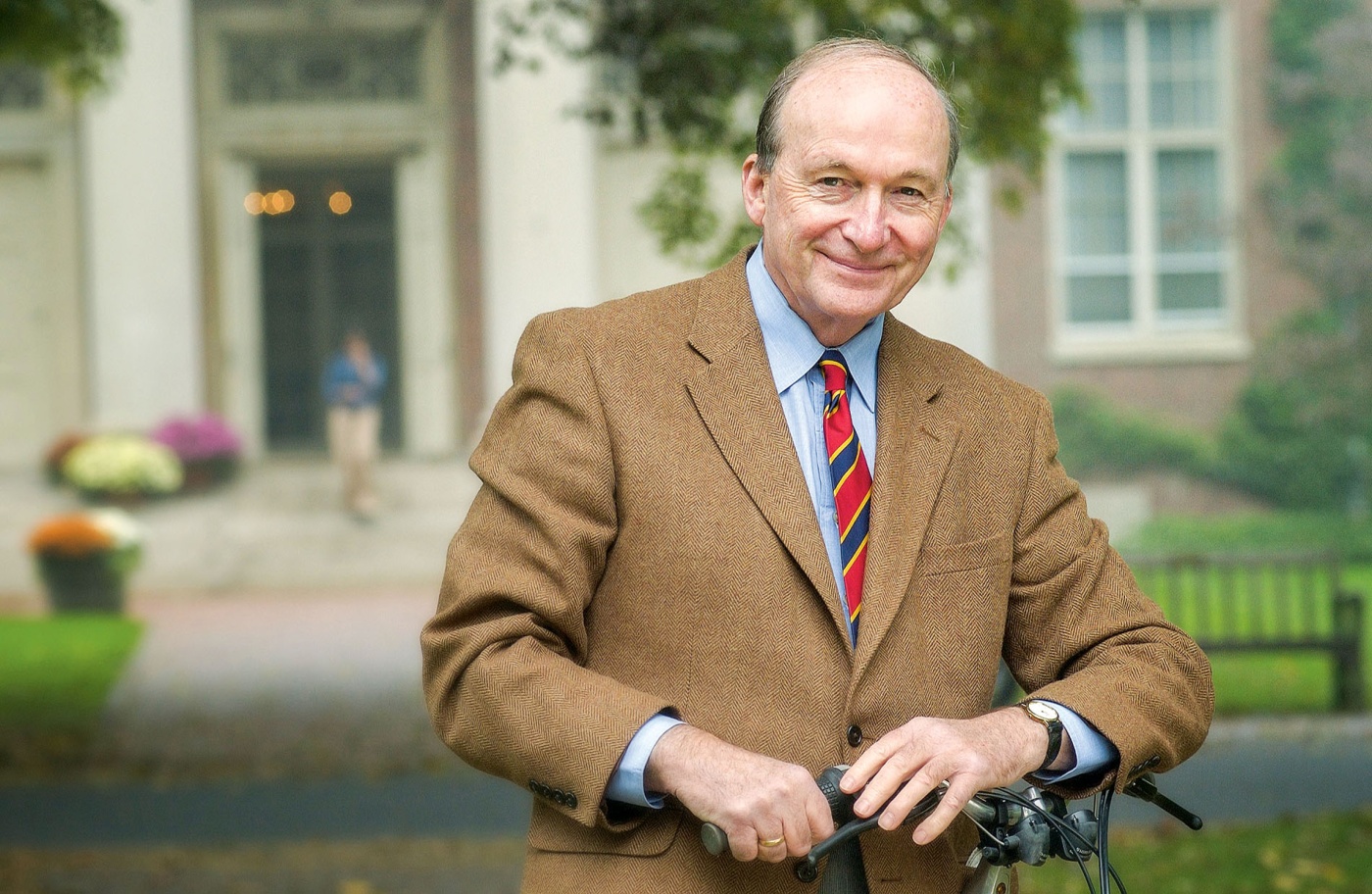Eric Widmer—who came to Brown as a Chinese history professor in 1969 and subsequently served as dean of student life from 1978 and then dean of admissions and financial aid from 1987 until he left Brown to be head of school at Deerfield Academy in Massachusetts in 1994—was widely known not only for his very tall stature and easygoing demeanor but for his extremely dry sense of humor. So much so that there is one story that comes up about him again and again: In 1979, he was called to the scene late in the night when members of the Delta Tau fraternity were throwing furniture out of their front windows on Wriston Quad. Asked by a Brown Daily Herald reporter on the scene if he thought the frat brothers were drunk, Widmer deadpanned:
“I certainly hope so.”
“That is so typical of Eric,” says Meera Viswanathan, a fellow Brown professor emeritus (of comparative literature) who, after many years of collegial friendship, was married to Widmer from 1991 until his death from cancer on January 18 at age 85, in Simsbury, Connecticut (on the campus of the Ethel Walker School, which Viswanathan has led since 2016).
“He was perhaps the most authentic person I’ve ever met—often to my chagrin and embarrassment,” she says. “He could be throwing a dinner party and stand up at nine p.m. and say, ‘It’s time for me to go to bed.’”
But those who spoke to BAM for this tribute also remember Widmer as supremely suited to the role of intermediary between then–Brown President Howard Swearer (whose tenure overlapped almost exactly with Widmer’s as dean of students) and the undergraduate community because he was so low-key and deft in handling disputes. In the 1980s, Widmer handled clashes related to student activism around racial issues, women’s issues,
and divestment from apartheid in South Africa.
“As difficult as those situations were, I give him credit because he always helped solve them through discussion and negotiation,” says Sheila Blumstein, a linguistics professor and dean of the college in years overlapping with Widmer. She says it helped that Widmer often knew students before he interacted with them as activists. “You’re much more likely to think of someone as human if you already know them a little.”
A key challenge for Widmer occurred in 1985, when students of color—whose primary demand was a new location for the Third World Center (now called the Brown Center for Students of Color), which at the time was in a basement—conducted a sit-in at the John Carter Brown Library. Swearer, insisting that the students be out by five p.m., dispatched Widmer to talk to them. He did so, cordially, then phoned Swearer, secured the president’s promise for a new place for the Third World Center, and took the news back to the students, who cheered and left the library just at five.
This account is from a charming 22-page chronicle of his time at Brown that Widmer penned before his death, shared with BAM by Ted Widmer, one of his two sons. “It had been a trying time and a crucible for Brown,” Eric Widmer wrote of the stalemate. “But the significance of what had taken place that afternoon was not lost on...us. History had been made, and Brown would be the better for it.”
Widmer was born in 1940 in Lebanon, where his American mother and French father were teachers at the American University of Beirut. He came back to the U.S. as an infant with his mother and attended Deerfield Academy and then Williams College before pursuing a PhD in Chinese history at Harvard. After his 25-year tenure at Brown, he headed Deerfield until 2006—and then helped King Abdullah of Jordan, a Deerfield graduate, open a prep school, King’s Academy, in the late 2000s. Widmer served as the first head of the boarding school, located in Madaba, Jordan, for a few years until his retirement.
Viswanathan says that though Widmer’s life with her spanned from Brown to Deerfield to King’s Academy to Ethel Walker, “Brown was always his first love.” In addition to overseeing the vast expansion of the Office of Student Life at a time when Brown was growing swiftly from a respected but relatively provincial college with a modest endowment to a university with an international reputation and reach, Viswanathan says he instituted a number of small but popular initiatives such as a series of weekly noontime organ concerts in Sayles Hall, at which he would provide apples and hot chocolate.
“Everyone brought their lunch and came,” she says, “from custodians to health center staff to graduate students.”
She also fondly recalled when Widmer used his deft diplomatic skills to not only secure permission from Swearer to ask Stevie Wonder, who was receiving an honorary degree from Brown at the 1987 commencement, to sing, but to then put the request to Wonder himself. She recalls, laughing: “He said to me, ‘We have a singer coming—I think his last name is Wonder.’ He hadn’t heard of him. And I said, ‘Oh my God, Stevie Wonder? You have to ask him to sing!’”
After persuading Swearer to break the longtime tradition of not inviting honorary-degree entertainers to perform, Widmer then stayed up all night in the lobby of the Providence Marriott Hotel, where Wonder was staying, to secure the gig in the morning. He succeeded. As he recalled in his Brown mini-memoir: “And so it happened. We all watched as he made his way from the commencement stage, walking under the elm tree, and up the Faunce House steps….”
Wonder sang his 1984 hit “I Just Called to Say I Love You.” Wrote Widmer: “As he sang, he adapted the lyrics to Brown and to the day. It was at once a thrilling and poignant moment.”
Son Ted, a professor at City College in New York City, recalls: “I can’t imagine a better dad. He attended everything we ever did. He was a commanding, large guy with a deep voice who was a natural leader in every situation. He was extremely worldly, emanated fairness and inclusion, and was fair and hard-working, always with a twinkle in his eye.”
In addition to Viswanathan and sons Ted and Matt, Widmer is survived by his first wife, Ellen Widmer, a Chinese Studies professor at Wellesley, and by his grandson, Freddy. A fund will be established in his name to send Palestinian students to King’s Academy.






